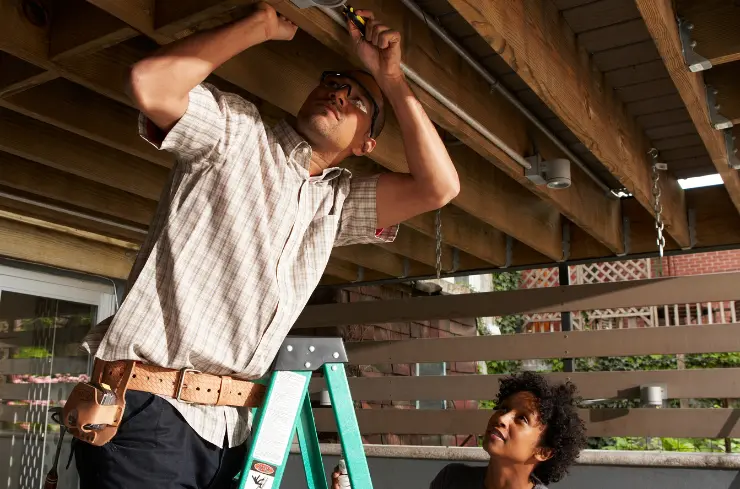There has been a lot of discussion about the potential of a recession in the United States. A recession is typically defined a period of temporary economic decline during which trade and industrial activity are reduced, often identified by a fall in GDP in two successive quarters.
With rising nationwide inflation comes the concern from property owners about how a recession might affect them. Although rentals typically offer better protection than other investments in a downturn, they’re not entirely recession-proof.
One of the biggest — and most obvious — concerns is vacant units. Below are some scenarios that could increase the likelihood of experiencing vacancies in a recession and create additional challenges for property owners, along with suggestions for counteracting them.

Losing Tenants Because Your Rents Exceed The Market Rate
If you’ve been charging higher rents than your competitors, a recession could cause your tenants not to renew their leases in favor of cheaper options. This could be a double-edged sword for property owners: They risk losing tenants who could otherwise afford their rents along with those tenants already unable to pay because of job loss.
As of August 2022, San Diego’s year-over-year rents are up 18%, compared to 14% nationally, and experts project they’ll continue to trend upward into 2023. Further affecting the rate hike is that California landlords are now legally allowed to increase rents by as much as 10% due to inflation. That means tenants are already more conscious of rental costs, so you want to ensure that your rents fall within the current rates and increase the likelihood that your tenants renew their leases.
Filling Vacancies Too Quickly
Although it’s tempting to rent out vacant units as quickly as possible in a recession to regain lost income, you’re much better off being more diligent than usual when performing background checks on prospective tenants. Carefully review their credit report, proof of income (or other acceptable earnings), and their rental history if they’re a previous renter to determine if they have a good track record in paying their rent on time. In the long term, it’s better to keep a unit empty until you can find a suitable tenant than to rent it out immediately to someone who isn’t.
Only Offering Standard Lease Agreements
It’s common to offer new and current tenants a standard lease agreement even during a recession, but why not negotiate a longer lease term at a slightly lower rate? That rate reduction could make your unit more appealing and encourage tenants to sign on the dotted line. Other attractive options include fee waivers, deductions, or doing away with certain restrictions, such as not allowing pets. Allowing pets enables you to expand your pool of applicants and chances of finding appropriate tenants.
Refusing to Negotiate with Tenants
Recessions result in company cutbacks and fewer jobs overall, and renters on the receiving end find it more difficult to pay their rent. Although the lengthy and expensive eviction process is sometimes inevitable, consider instead negotiating payment plans with struggling tenants. Negotiations could include temporary partial-rent payments, a rent freeze until a specific date (possibly with accruing late fees), or using your tenant’s security deposit as rent. You could even require more than one month’s security deposit from new tenants, growing your cash reserve and stretching that guaranteed monthly income a bit. For additional rental assistance, tenants could refer to the San Diego Housing Commission.

Outdated Building/Unit Features
If some of your rental units could use some upgrades, consider replacing appliances or updating flooring to encourage existing tenants to stay and feel like they’re getting more bang for their buck.
Also, be mindful of general building upgrades, especially where amenities are concerned (e.g., club room facilities, fitness equipment), to maintain your property’s appeal to current and prospective tenants. Although this requires an initial upfront cost on your part, it could pay off in the long term if your tenants value their standard of living.
Ignoring Maintenance Upkeep
If you’ve been putting off addressing building maintenance issues, take care of them now to prevent them from turning into more costly fixes down the road. These include leaks, structural problems, windows or doors not sealing properly, and weather impact.
Don’t forget to trim the landscaping, keep common areas such as lobbies, elevators, and garages clean and free from debris, and prevent garbage and recycling pails and dog waste stations from overflowing. A well-maintained building helps attract prospective tenants as much as it keeps current ones grateful for living in a clean and well-maintained environment.
Tenant Costs Other Than Rent
Recessions affect not only a tenant’s ability to pay rent but also their additional monthly expenses, such as utilities. Consider minimizing these costs by replacing insulation, installing higher-grade windows and energy-saving thermostats, and anything else that could help tenants keep more money in their pocket and be more likely to remain your tenant.
Remember also that some renters prefer to “shelter in place” during a recession instead of looking for a new place to live, which often incurs more costs, including moving expenses and application fees. By helping them stretch their dollars further, they’ll be more likely to hunker down and ride out the challenging market.

The Good News Is...
Although a recession isn’t without risk to property owners, it does offer one key upside: Recessions typically hurt the housing market more than the rental market. Fewer people want to commit to the considerable expense of buying homes during a recession, so they opt to rent instead. That means you not only have a good chance of renting out vacant units, but you also have more applicants to choose from and are more likely to find qualified tenants.
Furthermore, rents generally don’t dip during a recession; instead, they either increase or hover around the going market rate, which helps remove the sting a little from having empty rental units on hand. You could also incorporate out-of-the-box solutions in a tourist-driven city like San Diego, including converting vacant units into short-term rentals or temporary Airbnbs.
San Diego still has an eviction moratorium in place in response to the COVID-19 pandemic, and it awaits to be seen what the city might do in the event of a recession. But by thinking ahead and implementing some of the above suggestions, you can better weather any potential storm.
If you found this article helpful, follow us on social media. We post daily tips to help you manage your own rental property:
Steve Welty
Subscribe to our Weekly Newsletter
Join the 5k+ homeowners receiving Local Law Updates and Landlord Tips. Delivered to your inbox every Saturday at 6am PST.
Share this:
Get in touch with us:
We make owning rental property easy.
Choose Your Next Step
Good Life Blogs
We believe that education is empowering.

SB 52: California May Ban AI Rent Pricing Tools
California’s SB 52 could ban landlords from using AI to set rent prices. Learn how this bill may impact your rental business and what actions you can take.

Trash Collection Fees Coming to San Diego Rental Properties
Trash collection fees are coming to San Diego landlords. Learn who’s affected, how much it will cost, and how to stay compliant.

How to Turn Vacant Rental Properties into Tax Deductions
Learn how to turn your rental property’s vacancy into potential tax deductions. Discover the rules, strategies, and tips landlords need to know.







